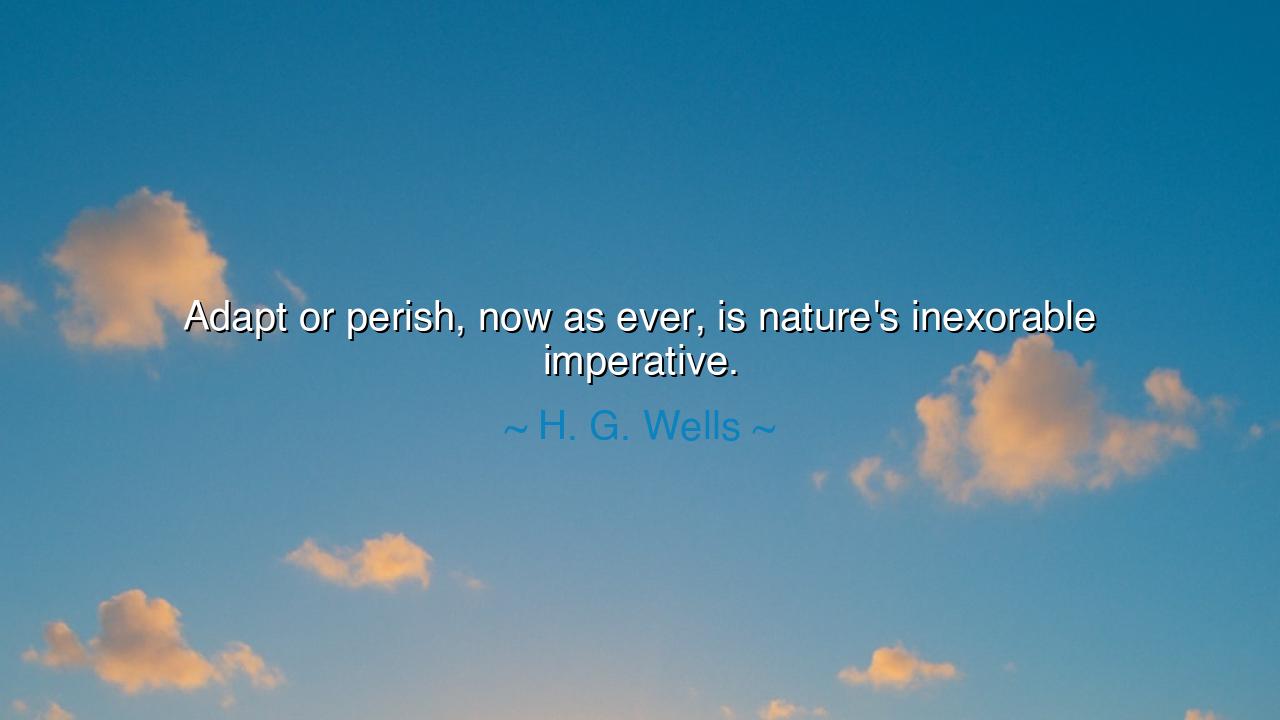
Adapt or perish, now as ever, is nature's inexorable imperative.






Hearken, children of reflection, to the words of H. G. Wells, who proclaimed with unflinching clarity: "Adapt or perish, now as ever, is nature’s inexorable imperative." In these words lies a profound meditation on the laws of life, the relentless march of change, and the eternal necessity of flexibility, resilience, and foresight. Wells reminds us that existence is not static; it is a river, ever-flowing, demanding that all who dwell upon its banks either bend with its currents or be swept away.
The essence of this teaching is the recognition of change as inevitability. Nature, in all her grandeur, neither waits nor wavers. The ice retreats, the seas rise, predators and prey evolve in a silent dance of survival. Those who cling rigidly to habit or expectation find themselves unprepared for the transformations that shape the world. Wells’ phrase, “inexorable imperative,” warns that this law is absolute: resistance is costly, and stagnation leads to decline.
History offers countless illustrations of this truth. Consider the Romans, whose empire stretched across continents. In their brilliance, they built roads, aqueducts, and legions unmatched in discipline. Yet as new tribes emerged, climates shifted, and economies faltered, those who failed to adapt to the changing political and social currents saw the empire fragment and perish. Adaptation was not merely an option; it was the essence of survival.
Wells’ words echo as well in the natural world. The dodo, once a proud denizen of Mauritius, thrived in isolation until the arrival of foreign predators and human hunters. The species, unprepared and unable to adjust to new threats, vanished, leaving only bones and memory. Nature’s imperative is impartial; she grants no reprieve to the inflexible, no pardon to those who refuse to learn, adjust, and evolve.
Yet adaptation is not mere reaction—it is courage, foresight, and creativity. Consider Charles Darwin, who observed finches on the Galápagos Islands. Each species had evolved uniquely to survive in its environment. Darwin saw that life’s triumph depended not on strength alone, but on the capacity to respond to challenge, to innovate, and to transform. His work illuminated the truth behind Wells’ stark pronouncement: adaptation is life’s sacred currency.
For humanity, the lesson transcends biology. Societies, technologies, and minds must evolve with time, knowledge, and circumstance. Those who cling to antiquated modes of thought or refuse to engage with the realities of a shifting world risk irrelevance or collapse. Wells’ call is a summons to vigilance, to the constant refinement of skills, strategies, and understanding, for stagnation invites oblivion.
Practically, one must cultivate flexibility, resilience, and curiosity. Observe the patterns of nature, history, and human endeavor. Be willing to relearn, pivot, and embrace innovation. Anticipate change, rather than merely endure it, and develop the inner strength to navigate uncertainty with grace. In doing so, one honors the law Wells so starkly declares: survival is intertwined with the capacity to adapt.
Thus, let this teaching echo through the generations: the world will not pause for our comfort, nor wait for our readiness. Adapt or perish is the call of life itself. Embrace it with courage, insight, and humility. Seek wisdom to perceive the winds of change, the strength to bend without breaking, and the vision to thrive amidst transformation. In this eternal dance with existence, to adapt is not merely survival—it is triumph, mastery, and harmony with the inexorable rhythm of nature.






AAdministratorAdministrator
Welcome, honored guests. Please leave a comment, we will respond soon